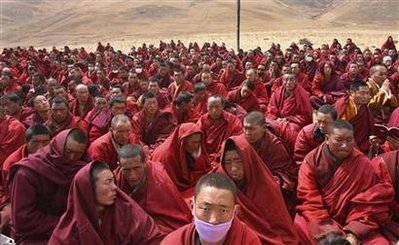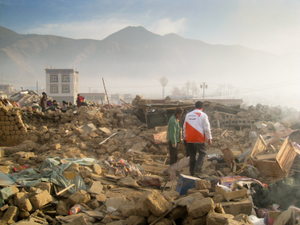
Tibetan monks attend a mass prayer for earthquake victims in the quake-hit Gyegu town of Yushu county, Qinghai province April 20, 2010. China will hold a national day of mourning for victims of an earthquake in the country's western region, the government announced on Tuesday, as the official death toll from the disaster climbed to 2,039, state media reported. REUTERS/Stringer
BEIJING (Reuters) – Horns and sirens sounded and crowds bowed their heads in mourning on Wednesday in the western Chinese province where an earthquake a week ago devastated the heavily Tibetan county of Yushu.
The official death toll from the magnitude 6.9 quake that shook a remote, mountainous corner of Qinghai province last Wednesday has reached 2,183, with 84 people still missing, the official Xinhua news agency said.
Most of the dead were ethnic Tibetans in Yushu’s main town of Gyegu, about 4,000 meters (13,000 feet) above sea level on the wind-swept Tibetan highlands.
At 10 a.m. (0200 GMT), ranks of residents, troops and officials in Gyegu and in Qinghai’s provincial capital Xining bowed their heads for three minutes while sirens and horns sounded, according to Chinese state television footage.
Television showed the nine members of the ruling Communist Party’s most powerful inner circle, the Politburo Standing Committee, led by President Hu Jintao and Premier Wen Jiabao, standing around a conference table with their heads bowed.
In Gyegu, residents and Buddhist monks also assembled on a hill above the town where hundreds of victims’ bodies were cremated last week, said Nami, one of the thousands of ethnic Tibetan monks who joined relief work in the town.
“We went to remember them, but now we have to focus on helping the survivors and rebuilding Gyegu,” he said by telephone. “People are very sad. They will be for a long time.”
Survivors camping at a sports ground and other sites in Gyegu also gathered to mourn while sirens sounded, the China News Service reported.
LATEST BLOW
The earthquake has been the latest heavy blow to this huge country where tremors, floods and droughts often strike.
A quake rocked the southwestern province of Sichuan in May 2008, killing at least 80,000 people, with thousands more unaccounted for and most likely dead.
But China’s ruling Communist Party has also used the disaster to demonstrate its ability to surmount natural disasters, and to rally citizens with a call of patriotic unity — a message that has given little attention to the role of Tibetan Buddhist monks in rescue efforts.
The Tibetan highlands have seen tensions between Tibetan residents resentful of central government policies and the Han Chinese presence, including deadly unrest in 2008, but Yushu was not among the places convulsed by major protest.
Three people in Gyegu told Reuters that government officials there were pressing monks from elsewhere to return to their home monasteries, and that some from the southwest provinces of Sichuan and Yunnan, as well as from the Tibetan Autonomous Region, had been prevented from entering.
“The government has told them to go back. Some are willing to, and some are under orders,” said one of them, a monk who asked that his name not be used, fearing recriminations.
Liu Wei, a spokesman for the Yushu government rescue effort, said he had not heard of any orders directed at monks. But authorities had to ensure some control of volunteers coming to the isolated town, he said.
“Because of the high altitude and difficult transport here, people coming without any planning can affect our work,” he said.
(Reporting by Chris Buckley and Huang Yan; Editing by Emma Graham-Harrison and Sanjeev Miglani)
[source: http://news.yahoo.com/s/nm/20100421/ts_nm/us_quake_china_3]

